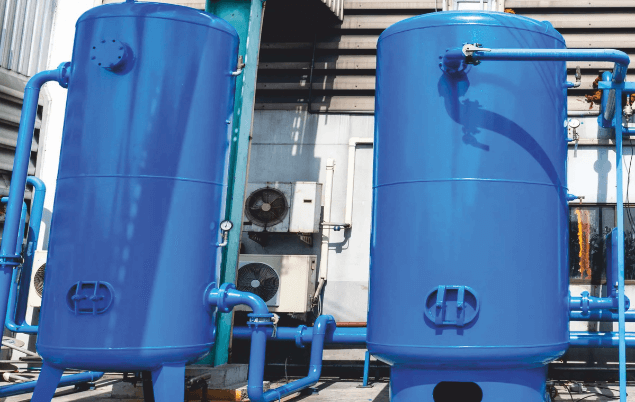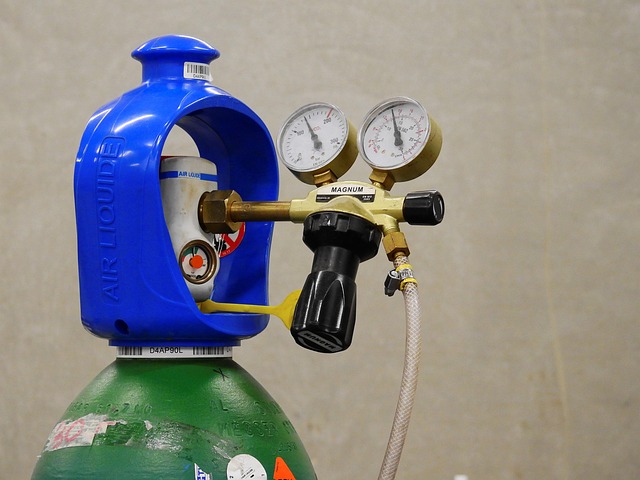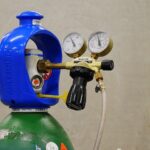A hydrostatic test is one test of the integrity, strength and leak-tightness of pressure vessels, pipelines, safety valves (calibration) and so forth by filling them with a liquid, typically water and putting them under pressure higher than the normal operating or design pressure. The aim is to make sure that the vessel is capable of pressure sustaining without leaking, deforming beyond reasonable levels or failing structurally.
Factory Act Section & Gujarat Factory Rule Applicable, and What They Say
Section 31 of the Factories Act, 1948, which relates to pressure plants (including pressure vessels), safety valves, and other fittings and which mandates that a competent person examine and test such plants is applicable to pressure plants. Trivedi Associates is qualified under this section and under Rule 61 of the Gujarat Factories Rules, 1963 to conduct inspections and testing of the pressure vessels or plants as well as certifying them in Form-11.
As described by Trivedi Associates in their service of Pressure Vessels for Gujarat State:

- External inspection of every service pressure vessel or plant should be done after every six months.
- The internal examination should be made after every twelve months, provided the vessel or the plant can be opened / it has internal access.
- In the event that internal examination cannot be conducted (due to the way in which the vessel is built) that internal examination can be substituted with an examination called a hydrostatic test, which must be conducted once every two year period.
- It may be noted that Hydrostatic test may be conducted every 4 year, but in lieu every 2 year either of NDT / Gama test required to be conducted. This period extension can be availed after informing Factory Inspector and upon receipt of approval.
- These regulations make sure that the inspection requirements are made on the design, use, and operating condition of the vessel.
What is Covered under “Pressure Vessel or Plant” (Definition Given in factory act 1948)
- Pressure vessels or plants consist of the vessels, any related safety valves or other valves necessary to relieve pressure, pipelines, etc., also a part of the pressure system. (Based on their competence as individuals under the Rule 61, i.e., pressure vessel or plant inspection and inspection of safety valves etc.)
- Rewrite,In continuous process vessels, also, internal access may be difficult or impossible because of the design. Those defined means are those whose construction limits internal inspection. These belong to the definition of pressure plant / pressure vessel to be able to apply rules.
In practice then, pressure vessel plant consists of :
- The shell (pressure vessel) itself (shell, heads, manholes, nozzles)
- Pressure reliefs and other safety valves installed on the vessel or plant.
- Any related pipelines, fittings and related valves which form part of the pressurized system that needs to be inspected in accordance with Rule 61 and Gujarat Factories Rules.
What to considered pressure vessel and what to not :
In order to find out whether it is a pressure vessel, we look at the purpose of the item, what it carries (liquids, gases or vapors) and the pressure under which the item is expected to work. A typical pressure vessel is anything that is working over 1 kg per sq. cm, though the design and intended use of the vessel is also of significance. A pressure vessel is fluid containing pressure external or internal to that of the ambient pressure, and at levels considerably different.
For in detail understanding of pressure vessel that need to be certified by competent person, contact Trivedi and Association.
How is It Performed
With the practice of Trivedi Associates and general method, hydrostatic test is carried out in the following manner:
- Preparatory measures: The vessel and other related components are cleaned and prepared. Make sure that all the openings, valves, safety devices are available. It is possible to open and clean it.
- Stuff with liquid: The vessel is filled with a liquid (typically with water) but without any air trapped (vented away through breather/vent points where necessary).
- Sealing/closing: All test-related closures, such as all valves, safety relies (where they exist), joints, flanges, and gaskets are closed or sealed in such a way that the test pressure is not discharged.
- Post-test inspection: Inspect permanent deformation, inspect internal parts when it is possible to open, examine dimensional stability, weld, thickness etc.
- Certification: When the test is satisfactory, the competent person will then issue a certificate (Form-11 under Rule 61 in the case of Gujarat) that the pressure vessel / plant is compliant. Trivedi Associates being an established competent individual does that.
What Needs to be Checked
When conducting hydrostatic tests and other related tests, there are a number of components that should be inspected closely. The scope of inspection of Trivedi Associates is:
- The pressure vessel itself Shells, heads, welds, nozzles, manholes. Investigating the structural integrity, weld integrity, corrosion or thinning. In case internal access was available, internal surfaces as well.
- Pressure / safety valves: It should be able to operate as intended, it should be adjusted properly and leak-free during test and it should be able to close properly after discharge. Trivedi offers its inspection / testing service to safety relief valves and maintains them.
- Pipelines/ related fittings/ valves: Pipelines, or any type of fittings, relating to pressure vessel or plant, should be included in the test or otherwise isolated, and their joints, flanges etc. must be sealed off to pressure.
- Instrument gauges: Pressure gauges should be straight and able to measure test pressure; safety devices etcl. should be calibrated.
Benefit of Such Test
Hydrostatic testing has a number of advantages:
- Securing safety and preventing disastrous failure: By detecting leaks, spots where the weld is weak or thinning, prior to causing real failure during service.
- Legal compliance: Compliance with the regulatory provisions based on Factories Act, Gujarat Factories Rules (Rule 61), SMPV Rules etc. Precludes penalties, shutdowns, warranted certification by competent person (e.g. Trivedi Associates).
- Operational continuity / reliability: The condition of the pressure vessel plant to remain in service is by minimizing unanticipated downtime, provides predictable performance.
- Guarantees to insurers / third parties / clients: Certification by competent reputable individuals (e.g. Trivedi Associates) generates confidence among insurers, regulators, clients.
What are the options to Hydrostatic Test?
Hydrostatic tests such as pneumatic testing (where the test medium is gas rather than water) are applicable to equipment that cannot be filled or dried safely and non-destructive testing (NDT) such as in-line inspection (ILI) (finding defects using tools) and acoustic emission testing (AET) or ultrasonic testing (UET) (finding leaks using sound waves).
Different test that can be performed in lieu of Hydrostatics test:
- In-Line Inspection (ILI): Can be applied using specialized equipment that is passed through the pipeline that is to be inspected which is able to inspect and identify a defect, it is a more detailed inspection compared to the hydrostatic testing of the natural gas transmission lines.
- Acoustic Emission Testing (AET): This is used to identify and locate leaks or stress through the sound of the system or the waves that are caused by the stress on the system.
- Ultrasonic Testing (UET): This is done by introduction of ultrasonic waves into the material and observing the echoes to identify defects or leakages.
These tests make hydrostatic testing a vital part of Factory Act inspection in Gujarat, serving both industrial and regulatory objectives.
When and How NDT Can Be Performed in Option to HT
NDT services ( Non-Destructive Testing ) are also part of the service portfolio of Trivedi Associates. NTD techniques can be used to supplement or replace parts of the hydrostatic / internal exam regime in certain regulatory situations in which internal examination is not feasible or in certain regulatory situations.
When NDT is an option
- In the case construction of a pressure vessel or plant cannot be readily accessed internally (e.g. a vessel cannot be opened) regulations permit the internal examination to be substituted by hydrostatic test with the frequency of two years. Regulatory acceptance Sometimes NDT can be applied in place of hydrostatic test or a combination of both.
- Rule 61 allows extension of internal examination period to four years in continuous process plants where frequent internal examination caused by opening the plant is disruptive. Under such conditions, NDT can be more suitable between such big openings for inspection every 2 years.
- They are also involved in the provision of NDT services (including thickness testing, wet magnetic particle inspection, dye penetrant etc.) that can be employed in detecting flaws, thinning, surface cracks etc., under SMPV (U) Rules 2016. How NDT is performed
Trivedi Associates states that they do NDT techniques such as:
- Thickness Testing (ultrasonic type) to test wall thickness, to detect thinning.
- Wet Magnetic Particle Inspection (WMPI) of surface or near surface defects of ferrous materials.
- Dye Penetrant Testing to identify cracks on the surfaces.
Conclusion
It is obligatory to carry out hydrostatic testing of pressure vessel plants under Indian law, especially Factories Act, 1948 and Gujarat Factories Rules, 1963 (Rule 61), and under the SMPV(U) Rules as being applied to some vessels. It can guarantee safety, the observance of the law, prevent any leakage or breakage, and contribute to the security and integrity of the equipment of critical processes. Regardless of hydrostatic testing or additional Non-Destructive Testing, the objective is always the same- to protect people, equipment and operations in line with the statutory requirements of Factory Act inspection in Gujarat.
They are well informed to an extent that they can ensure secure, compliant and sound operations. Additional information or to access their services visit; Trivedi Associates.




